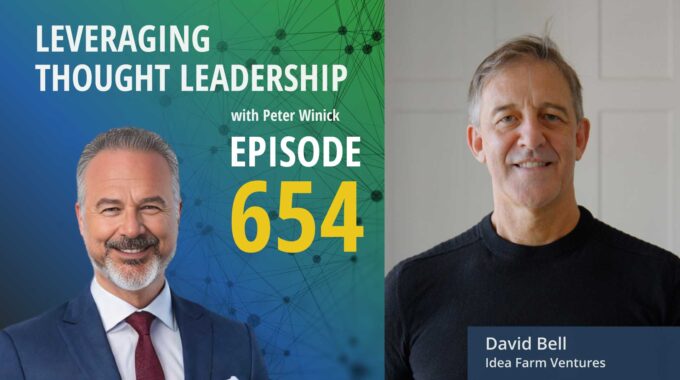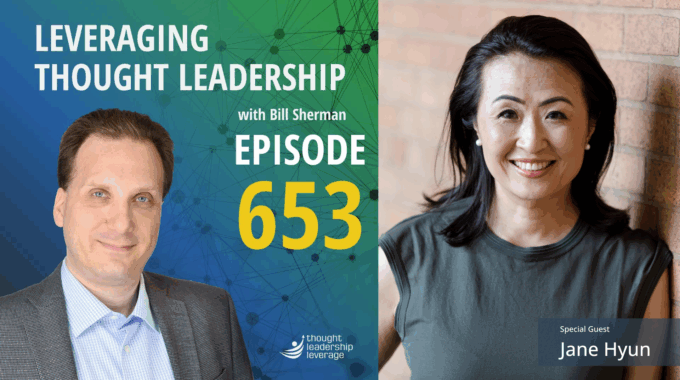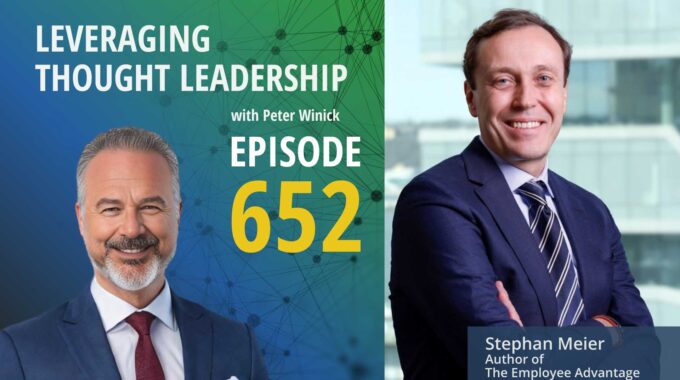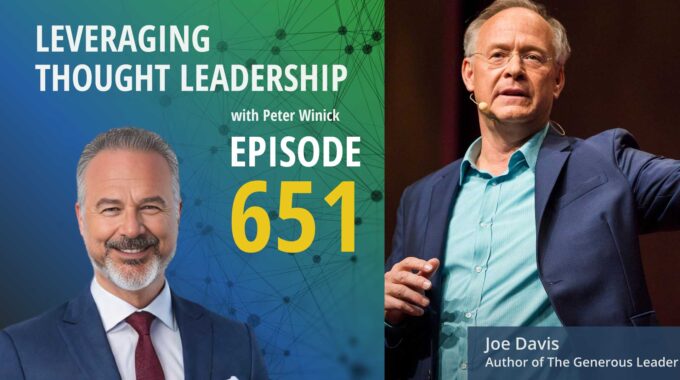Turning frameworks into funding: The hard truth about scaling thought leadership. This episode explores how…
How to Balance a Day Job with Your Passion for Thought Leadership. | Lance Mortlock
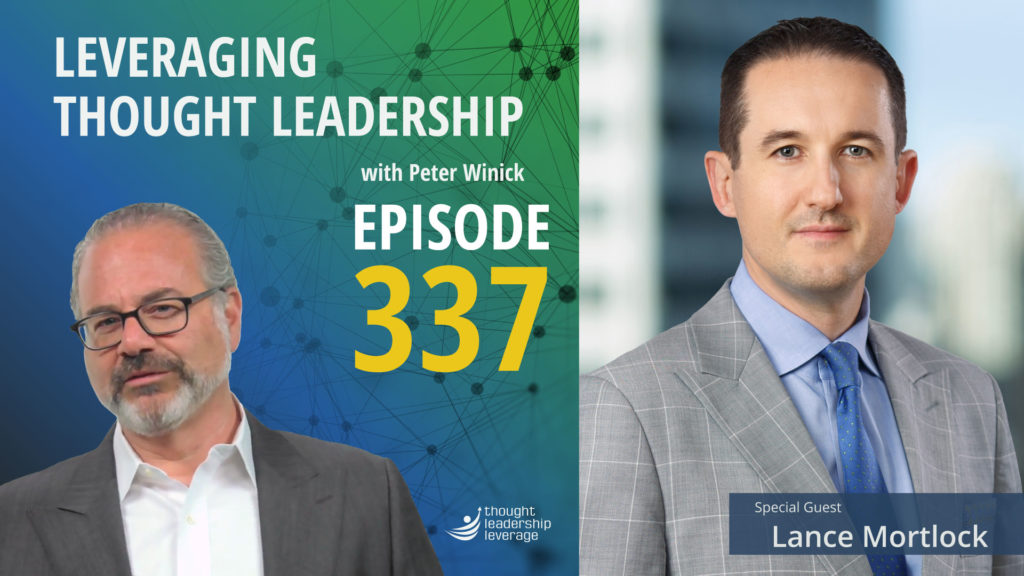
Thought leadership authorship and developing your personal brand.
An interview with Lance Mortlock about splitting time between your day job and your thought leadership passion.
How do you plan for something you can’t predict?
Today’s guest is Lance Mortlock, a Strategy Partner at EY (Ernst & Young) Canada, where he manages a team tasked to drive growth for clients in the oil, power, and mining industries. Earlier this year, Lance authored his first book, Disaster Proof: Scenario Planning for a Post-Pandemic Future. Disaster Proof is a practical and accessible guide for identifying risks, facing unpredictable challenges, and planning for the future.
Lance discusses the process of writing an in-depth thought leadership book while also working a demanding day job. Getting the book across the finish line required long hours, the support of his family, and surprisingly, the support of his employers at EY. Employers might be quick to think that writing a book would take away from an employee’s daily focus. Not always true! Lance explains why elevating his personal brand elevated his employer, as well.
Also, Lance had many years of articles, papers, and industry experience that give business leaders the tools they need to understand a volatile, rapidly changing world. Organizations with long-term thinking will excel in competition, and their leaders will be prepared to handle unexpected challenges. He discusses why business leaders need a wide view, to predict and understand long-term forces that will affect their organization.
We wrap up by discussing the difficult and often uncomfortable task of marketing a thought leadership book. Many writers and thought leaders are not used to having to push sales, but it’s important to get your text in the right hands. This means shepherding a consistent present on social media, and understanding that increasing book sales requires a slow but continual effort.
If you are currently working on your first book, and trying to navigate balancing your day job and marketing your finished text, this episode has a wealth of helpful information. Think long-term – and be consistent!
Three Key Takeaways:
- Thought Leaders don’t have to leave their current organization to develop their own brand. Enriching your personal brand can be beneficial to both parties.
- A book based on your Thought Leadership can stem from the articles and materials you’ve published in the past, combined with an expanded viewpoint for the future.
- If you want your Thought Leadership book to be a success, you’ll need to create a flourishing social media platform to announce, elevate, and enhance publication.
If you need a strategy to bring your thought leadership to market, Thought Leadership Leverage can assist you! Contact us for more information. In addition, we can help you implement marketing, research, and sales. Let us help you so you can devote yourself to what you do best.
Transcript:
Peter Winick And welcome, welcome, welcome, this is Peter Winick, I’m the founder and CEO of Thought Leadership Leverage, and you’re joining us on the podcast today, which is Leveraging Thought Leadership today. My guest is Lance Mortlock from Ernst and Young. Lance is an Ian Why Canada’s strategy partner at the Canada Oil and Gas Leader based in Calgary. He was formerly the Canadian Strategy Services Leader and director at EY. He’s provided management consulting services through over 130 projects across the globe and has had the opportunity to work with leading national and international energy and utility companies. Lance is also authored a new book called Disaster Proof. So what I find interesting about Lance is he’s clearly got an important day job at EY. Yet he’s found the time to carve out his own niche as a thought leader and put a book out. So you sort of straddle two worlds here. So let’s first talk about what drew you into this. It wasn’t probably wasn’t lack of time. Like, I have time to fill in. Like, I guess I should write a book because I don’t want to take up knitting, but what drew you to this?
Lance Mortlock Yeah, that well, firstly, Peter, thanks for having me on your on your podcast. Yeah, I mean, there’s two parts to your question. One is how did I find the time? I think I always wanted to kind of get a book over the line. And so you just kind of figure out how to squeeze this stuff then. So lots of very early morning starts and just got it done over a couple of years and it was important for me, Peter, I would say to not only kind of be seen as a strategy partner, helping companies with complex problems, but also a thought leader. And I kind of pride myself on having a perspective, and I really wanted to have a perspective on this particular topic. I think it’s important and it’s really why I wrote the book and why I want to get the book in as many hands as possible.
Peter Winick So how do you balance then? Because let me sort of set this in many instances when you have someone at a firm like E&Y or any firm could even be the founder of a consulting firm or whatever the case may be, and they’re putting out thought leadership. It’s clearly done in service of the business as the primary motivator, right? So it doesn’t that doesn’t make that good or bad. It’s just it’s clear that someone in that position, it’s logical. They write a book about the framework and the methodologies and all that stuff here. In your instance, it’s not directly aligned to what your functional responsibility is or even to what E&Y does. So how do you sort of balance that?
Lance Mortlock Yeah, like that’s a deep question, Peter, and I figured you might go there pretty quickly.
Peter Winick I will have 20 minutes.
Lance Mortlock Yeah, you go straight to the point, so thank you for that. So it’s interesting. It is the first thing I would say is, and I’m not I’m not just saying this because I have to. I think EY has been as a global juggernaut in consulting you aware with several hundred thousand people. Nothing but supportive through the process. But you’re right. Like, they don’t directly get branding and positioning credit for this because it’s not branded physician. It’s me. It’s Lance Mortlock. But I do think that there’s an element of EY looking at this and saying, You know what, if our partners and our leaders in the firm are paid branded as thought leaders, it’s all good. Like it, or it gets
Peter Winick to stay there for a minute so that there’s two trends that happen here. One trend is we, as the organization will get behind it, control it, it, et cetera, et cetera, et cetera. The other is, Oh, we’re afraid. You know what? If they you know, it’s sort of the old joke of what if I train my people and they leave? And it’s like, Well, what if you don’t train them and they stay right? So if you’ve got a firm like in why that tends to have really smart people working there, because that’s the only asset they have, right? Smart people are going to want to do fun, cool, interesting things. Sometimes it’s dead on related to their day job. Sometimes it’s not. So I see some parallels to sort of the Google free time, but, you know, giving folks freedom to do things. And I’m sure they didn’t say to you, Oh, don’t worry, Lance, this year you don’t have to build any clients, right? They’re supportive. You know, lowercase s supportive and there’s capital S supportive.
Lance Mortlock Yeah. I mean, again, great question. It’s interesting because I think I’m a proponent and I think our culture EY is certainly like this and I’ve worked elsewhere and I know others that have worked in other consulting firms. I think our culture is. Yeah, you can take the track of don’t do this, it doesn’t. It doesn’t directly tied to selling services and delivering work. But the risk is, if you don’t do it, you’re going to upset people and frankly piss them off a little bit and they’re going to leave and go and do it anyway. So that’s not a good outcome for any firm. And I always feel like, you know, in our culture EY, our leadership team has always encouraged this kind of stuff. And an example of that, Peter would be, you know, our chairman in Canada, and I don’t think he would mind me saying this. He has been nothing but supportive, in fact. You know, he bought a bunch of the books. He’s using them with clients. And I definitely feel that level of support. But it could have gone down another road and it didn’t, for sure.
Peter Winick Yeah. So I think that’s. I think that’s great for both you anyway, because you got to do something that that you were. It seemed like this you were driving to do this. There was something calling you to say, You’ve got to get this book, I’ve got to get this book out and nothing calling you. This is and I have to leave here, right? Because those are two totally different pieces. And I think oftentimes firms, either they’re afraid they’ll create a monster in a good way, like someone will get too big for their britches. But it’s a win. I think it is. You know, kudos to the firm PR. Yeah, we’ve you know, here’s some things that our folks do. They write their free time, their master chess players, their downhills, whatever, whatever it is, you know?
Lance Mortlock But yeah, no. And it was interesting because when you and I were kind of prepping for this conversation a few weeks ago, you kind of asked me a bunch of questions and I was like, Why? Why is Peter asking me these questions? And what I think you are getting at was? Well, normally when people do this, you know, they’re setting up to launch something different, and that’s never crossed my mind, you know, like, it was a great company. I think our firm is great and it’s why I’ve stayed at the firm a long, long time and hope to continue to stay at the firm long into the future. So I think it’s a bit of an unusual situation by the sounds of it. But you know, it is what it is and it’s been good so far.
Peter Winick No, that’s fantastic. So let’s talk a little bit about the process because I think I picked up a few moments ago in the conversation, a number of years it took. So let’s talk about what the actual process of writing a book looks like, because I think people have this glamorous, you know, you sit out, sit out on the deck with a cup of tea.
Lance Mortlock Or gin and tonic.
Peter Winick Yeah, yeah. Right? No worse, right? Right. Or both. And then, you know, words flow and you know, it’s easy. And you know, la la la la la. But what was the process actually like to get? You know, it’s a lot of words like, how do you do that? How do you find the time? Tell me about your process there.
Lance Mortlock Yeah. So I mean, a few things that I would say, you know, this kicked off for me. I’ve been thinking about writing, I’ve been thinking about writing a book for a long, long time, and I always felt as a strategist, you know, I’ve been doing strategy consulting for 20 years. Like, at some point, if I want to elevate the brand, the capability that I have, this has to come at some point. And you know, as you and I have talked about before, Peter, like I, I’ve written tons of points of view from, you know, the DNA of the chief strategy officer to business resilience, 30 points of view over my career and extensively published in in the media on a variety of business topics. And the beauty in a lot of the past work that I did, particularly around, you know, points of view I’d written around integrative planning, strategic planning, thinking about the future, how you build business resilience. I’d written the bones of aspects that came together in the book in some of those pieces in the past.
Peter Winick So stay there for a moment because I think this is a key point. Many people think that when they get into book mode, that, you know, because books have deadlines and deliverables and there’s other people involved, whatever that they’re starting with a blank slate. And the reality is, something drew you to say, you know, a book is just a it could be a forcing mechanism to get you to codify bill. You’re thinking it could be a longer way to tell the story and show what you’ve got to do than you did in the shorter form pieces that you did before. But I think the point that you just made there, which is a key one, is you didn’t start with a blank slate, although you started with a blank slate relative to you haven’t written the book before. You had other assets to pull from and other thinking that you’ve done. And I would imagine a lot of that landed in the book. You know, maybe, maybe it got morphed a little bit or changed a little bit or not verbatim what percentage of your previous work do you say was used or is now represented in the book? Is the book half new half sort of rethinking of old thoughts?
Lance Mortlock Or maybe a little bit less than that? I would say in terms of, you know, maybe it’s 30 percent old or 40 percent old and 60 percent new, but I think you’re right. I mean, you’re spot on like the process of thinking through. It was, yeah, like some of this stuff is still relevant. It’s still timely. I can integrate that. But then there was, you know, a couple of years of new stuff that I had to think and develop and research, either through reading other books, reading stuff, online, reading, you know, academic papers and it all coming together. And then in terms of the process itself, you know, as a partner, I’m very, very busy. So naturally, there was one year like. Last year, during the pandemic, I was literally getting off at four a.m. every day and working from four a.m. to seven a.m. to get this done. And then from 8:00 a.m. the rest of the day doing my day job and what I’m supposed to be doing day to day that was full on pizza, it was incredible. It’s been an incredibly tough year and living in the pandemic as we all have been. So oh, that little inconvenience that small things. So yeah, like just a hard, hard process to get through. But certain parts of it easy in terms of, yeah, I can leverage a bit of this and a bit of that and bring it together and succinct way.
Peter Winick If you’re enjoying this episode of Leveraging Thought Leadership, please make sure to subscribe. If you’d like to help spread the word about our podcast, please leave us a review and share it with your friends. We’re available on Apple Podcasts and on all major listening apps, as well as at Thought Leadership Leverage dot com forward slash podcasts. So let’s go back to that process. So I’ve heard all sorts of stories about folks, so it sounds like for you part of this was a routine, right? You could wait to wait for the time to come to you or carve out, you know, four to seven a.m. is usually the time we’re in the fetal position, right? Right. But you committed that time, and I would imagine it was sort of a routine, right? It might not be the most pleasant one given the time of day, but you stuck with that right? And was there trial and error there? Or that’s just, you know, sort of how to manage time for you because everybody’s, you know, four to seven might work for you. That might be a nightmare for somebody else.
Lance Mortlock Yeah, I mean, I for those that know me and have worked with me over the years, I’m a highly, highly structured person in my life, almost to my detriment. And so that, yeah, like that routine of. This is my think time. This is my right time, and I’m going to just get it done. I religiously go through every day, day in, day out. That’s how I got through it, Peter. And that’s how I kind of balance, you know, as does a partner, as a board members, all the different things that I do and life that that’s just kind of what you do to get the things that you need that done. And you know, the other thing I would be remiss if I didn’t say, I’m incredibly lucky to have a very supportive family. Yes, this was it was important for me. We talked about a couple of years ago, we said, I said, Look, I want to do this, but I need you guys to be more. This includes my two, my two girls, right, and my wife. I said this you need to be brought into this because it’s a process. It’s going to be a sucker of my time.
Peter Winick And, you know, want them to resent, resent you? Exactly. So I remember a story that a good friend of mine, who’s a very well-known author, told me that, you know, he did his first book and didn’t carve out the time was super busy speaking, doing all the other things. And it was, oh, he was like, you know, him and the publisher going head to head, where is that draft? Where’s that draft? You know, pulling all nighters and doing all the sort of crazy stuff? And when he got the second book deal after the first book was a wild success, he said, OK, I’m going to I’m going to be a little bit more mature about this and I’m going to cut down my schedule 30 percent and I’ll do, you know, writing weeks and then, you know, just do the opposite of that because that was a little bit sloppy. Well, and push came to shove and the deadlines hit, and there was still not enough done, and he couldn’t figure out why. Like, wait a minute, I cut. I literally cut my schedule off by a third, which is a huge financial hit opportunity cost wise for keynoter back in those days, et cetera. And then it came to him that actually most of his writing was done on airplanes because he was flying around so much. So he called United, which he was platinum on and said, Listen, you know, I’m a million miles, whatever, whatever, whatever I want to get on a plane at JFK Monday morning, and I don’t want to come home till Saturday, just zip me up in the air as much as you can. So it was like New York to Portland, Portland, Miami like literally just fly, fly, fly, flight fly. And he knocked it out. And for him, there was a ritual of being on the plane, putting on headphones, having a cocktail, not knowing the phone is off. That was his sort of place to write. Other day writers cabin at 30000 feet.
Lance Mortlock I know what you mean, and I don’t know if you were going to go here, Peter. But what I would say is like the last 12 months have been pretty unique. Yeah. Like, I also looked at a, you know, as I was really, really kind of getting into the writing mode and sort of early concepts were becoming much more like you could feel them. Yeah, I was like, Well, we’re in a pandemic. So we’re in a bit of a unique situation where I’m not traveling. I’m not going to work on a regular basis. I’m not getting on a plane. I’m at home. So there was more of a window of time where I could, you know, pump stuff out.
Peter Winick Well, I’ve been calling it for the last six months, what I’m calling the COVID renaissance because you take a bunch of smart people, give them more time back and some of that voluntary involuntary, even though you’re still obviously busy. Why just the travel? Right. So I would, you know, I was do 120000 miles. You I don’t know how I fit that in when I look at my schedule today. Right. So what happened is a lot of people said, Well, Jesus, I books, I want to write or this research I want to do or this thing I want to think about or whatever. And we’re starting just at the beginning. It’s been the last two or three months where we’re seeing some of the outcomes. Your book being one of them of what if people done. And it’s not necessarily that the content is pandemic related, but wow, I finally have the time to do, you know, it’s the ultimate AB test. It’ll be interesting to look back and five years to see if we saw a spike of computers. Yeah, because we’ll all baseline to some new normal, whatever that that means or doesn’t meet, you know, whatever. Interesting. Interesting. So anything that you would have done differently or would do differently the next time if there would be one?
Lance Mortlock Anything I would have done differently. Yeah, it’s funny, you kind of look at these things now that the book’s out and it’s released and you’re like, Oh, you know, what about this? And I could have done this? But I think that that would have been for any if I write another book in the future, I think I’m always sort of that self-critical and will always look at something like I’ve done that, you know, through the projects I’ve delivered with clients and points. The curse of the
Peter Winick perfectionist, right?
Lance Mortlock Yeah, yeah. So there’s always things, Peter, that you kind of look at and say, I should have done an extra job. But I mean, overall, I’m very happy. I mean, I think I think the book is very timely. The as we were just talking earlier about, you know, coming out of the pandemic and things are getting back to normal for you in New York, I wish I could say the same for me here in Canada. But as things come back to normal, I think management teams leaders are really going to say, Well, that was pretty awful. That was pretty terrible. Like, let’s look at the future now. And I think this this is a great book for leaders and boards to kind of look at the future and say, like, how well prepared are we?
Peter Winick So last point I want to touch on is we’ve talked about the grueling. Nature of actually getting a book to the finish line. We haven’t talked about the other side of this, so writing a book is clearly not an easy thing to do, particularly when you have high standards or perfectionist, et cetera. Marketing the book is a totally different set of skills that I would argue that most like north of 90 percent of authors, writers, thought leaders, et cetera. It’s just not who they are or what they’re about or the capabilities they have. What have you learned or experienced on the on the marketing side of the book?
Lance Mortlock Yeah, it’s funny. You should ask this. I was talking to a colleague, a colleague this morning and we were talking about the marketing. It’s a little bit uncomfortable. I would say, Peter and as a Brit originally, you know, I was never used to really pushing something and pushing sales of the book. And my publicist said to me, You know, you need to be on social media once or twice a week. Like, what’s the saying? Like, unless you get a message into someone’s hands, sometimes you know they’re not, they’re not actually going to make a purchasing decision. And so that has been a journey. You know, I would say for me to really understand that you need to keep on this. I mean, it’s a slow, continuous burn of. What about this? What about this? Here’s what we’re doing here is his rethink. Yeah. And that for me, and like, you know, in my core, is quite uncomfortable. But I’m doing it because I
Peter Winick absolutely love about it because most, most, you know, authors are more or leaders are a little bit more introspective and thoughtful and research based. And now it’s like, you’ve got to be a bit of a showman or a promoter. I mean, it’s like, Oh, I didn’t become a consultant to do that or ooh, it’s you know. But I think if you if you start to think about it in service of the book, because all that effort that went in the book is futile if it doesn’t get in the hands of people. And the best means to get in the hands of people are things that you could do in a way and no one’s ever come back to you and say, Oh my God, stop selling. Stop that right? And I think that’s everyone’s fear is like, you’re going to be that guy. But it rarely happens if you do it with authenticity, integrity and all those things. Yeah, exactly. Yeah. Well, this has been great. I appreciate your time and your willingness to share your story and your journey. And thanks for coming on today.
Lance Mortlock Yeah. Thanks, Peter, for having me.
Peter Winick To learn more about Thought Leadership Leverage, please visit our web site at Thought Leadership Leverage dot com to reach me directly. Feel free to email me at Peter at Thought Leadership Leverage dot com and please subscribe to Leveraging Thought Leadership on iTunes or your favorite podcast app to get your weekly episode automatically.



